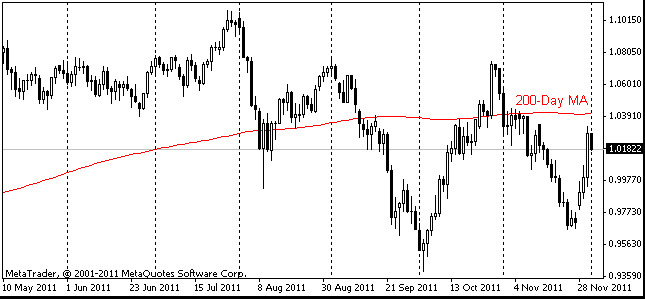EUR/usd
The chances that Greece will receive another 130 billion package from the EU and the IMF significantly grew on Wednesday. On Thursday Eurogroup chairman Juncker convened the meeting of finance ministers to allocate money to Greece for it to avoid default. This news supports the single currency rate. The euro has already risen to 1.3280 against the dollar and is significantly growing against the pound and the yen. Later in the day the ECB will hold its regular meeting. Just a few are expecting a change in the rate, though some speak about the necessity of its lowering. The market participants mainly focus their attention on the comments of the Bank and its chairman draghi about the Greek debt and further steps to maintain the market liquidity. These two issues more than anything now affect the ability of the region to survive the sovereign debt crisis. Earlier there were rumours in the market that the ECB could exchange the Greek debts into EFSF securities at prices lower than face value. It would be a concession to the debtor and could help private investors feel that they are not the only ones who bear direct losses. However, it's rather doubtful if the ECB's losses on 40 billion debt securities will be this very factor which will help Greece to get out of the crisis. Nevertheless, the favourable news from the euro area may support a short-covering rally in the euro, triggering its bounce above 1.34.

GBP/USD
Thursday is no less important for the British currency as well. The meeting of the BoE Monetary Policy Committee may cause a stir if it doesn't meet the expectations. Now the markets look forward to the expansion of the asset purchase programme by 50 billion pounds, because the purchases for £ 75 billion declared at the October meeting were to be made by February. Earlier the Bank had a serious reason not to expand the programme because of high inflation, now this issue is not that acute. At the beginning of London session yesterday the sterling rose to the level of the 200-day moving average, but then fell on fire-sales of the euro. The euro/pound has good chances to reverse. The pair has risen from 0.82 to 0.84 since the start of the year, but potentially it may go up much further.

USD/JPY
The Japanese currency keeps falling, having been rewriting local highs for five consecutive days. During the Asian session USD/JPY went above 77.20. However, the most noticeable movement was in the crosses with the risk sensitive currencies. EUR / JPY rose to its two-month high, GBP / JPY reached such a peak yesterday too, but quickly dropped, AUD / JPY also closed yesterday's trading at the highest level since August.

AUD/USD
The market seems to have moved on to the next stage of the risky asset rally. In the first phase just a few interesting securities were actively growing. Later they were joined by commodities, but safe currencies were still sticking to the same levels. Now that the market has stopped worrying about a new recession and is trying to reevaluate how strong the growth in the US is, such currencies as the aussie and Kiwi get additional support from the sale of the safe yen and Swiss franc. The movement in the AUD/JPY is likely to be of the greatest interest.
